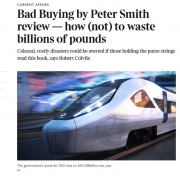The 2021 Bad Buying Awards – the Two Final Awards
Today, our final two Bad Buying awards for 2021!
Creative Fraud: I-Tek, its Owner and Staff
Multiple Fraud Related to Imported Goods (and more…)
This case may seem relatively small compared to some of the mega-waste examples we have seen this year, but what made it a worthy winner was the way it combined three distinct types of procurement fraud in one rather neat package.
Beyung S. Kim, owner of Iris Kim Inc, also known as I-Tek, and his employees, Seung Kim, Dongjin Park, Chang You, Pyongkon Pak, and Li-Ling Tu, pleaded guilty to a procurement fraud scheme involving millions of dollars in government contracts over several years, mainly supplying various US defence agencies. They were sent to prison in August 2021, after providing everything from swimming trunks for West Point cadets to spools of concertina wire. The problem was that the goods were made in China, but were illegally re-labelled to look like US-made products. That violated the terms of the contracts as well as laws that stipulate certain contracts must be fulfilled by US-made products.
The second fraud came when investigators found that an employee who was a disabled military veteran was listed as the firm’s president in some bids – but he wasn’t. That meant the firm was eligible for contracts reserved for companies owned by disabled ex-service people. (We’ve seen a number of frauds of that nature in recent years, so of which are featured in my Bad buying book). Finally, the conspirators also submitted false documents and lied about the value of the goods imported into the U.S. to avoid higher duties and taxes.
All in all, a pretty wide-ranging procurement fraud, covering several relatively common areas of illegal behaviour, adding up to an impressive winner of the Bad Buying Creative Fraud Award.
…..
Not Really Technology Award: Greensill Capital
Not an SCF FinTech, Just a Risky Lender (and Several Very Naughty Boys)
Greensill Capital, the firm built by Aussie farmer’s son Lex Greensill, collapsed in March, and the losses to investors who backed the firm are still unquantified but may run into billions. The UK taxpayer is also on the hook for state-backed loans and perhaps even pension support for steelworkers (because of Greensill’s close links with Liberty Steel).
Greensill presented itself as offering innovative tech-backed supply chain finance (SCF) products, but (to cut a long story short), their business model turned out to involve borrowing money cheaply by presenting the investment as low risk, then actually lending it out in a VERY risky manner.
Ultimately, it was lending money to the Gupta Liberty steel empire based on the “security” of vague future revenue flows that did for Greensill. Some of those revenues were supposedly going to come from firms that weren’t even current customers of Liberty!
This was not “supply chain finance” in the sense that any off us in the supply chain world had ever heard of before. It looked very much like unsecured lending with funds coming from sources (including Credit Suisse-promoted bonds) who were unaware of just how risky that lending really was. Greensill also talked about being a “fintech” business, which they clearly weren’t, but dropping that bit of bulls**t into the conversation gave the firm more credibility. Their lending was facilitated through other genuine fintech-type platforms such as Taulia.
Lex Greensill himself leveraged his role as a UK government “Crown Representative”, working to promote SCF within the Cabinet Office, to wheedle his way into winning some work in the public sector. He was supported for frankly incomprehensible reasons by a number of key people, including the late Sir Jeremy Heywood, the Cabinet Secretary. The various investigations showed that some senior procurement people and politicians were not taken in, including Minister Francis Maude, but Greensill got onto a Crown Commercial Service framework, and won contracts for offering NHS payments to pharmacies as well as “salary forwarding” to some NHS staff.
Government’s Chief Commercial Officer at the time, Bill Crothers, initially didn’t seem keen but came round to the Greensill cause, and became a director of the firm, no doubt encouraged like ex-Prime Minister David Cameron by the prospects of making millions. Cameron’s behaviour has stained his reputation – such as it was – forever. Having left office, he harassed everyone he knew in government to promote Greensill’s cause, right through to 2020 when he tried to gain advantage for Greensill under pandemic financing and lending schemes.
We can’t call what happened “fraud” yet, although investigations that might lead to criminal charges are continuing. It is hard to believe that nothing criminal went on, but we will see. However, whatever it was, it fully deserves the Bad Buying Not Really Technology Award based on the scale, innovative nature and continuing implications of Greensill’s actions. Indeed, if we had nominated an overall winner this year, I suspect Greensill would have won that ultimate accolade…
Happy New Year and let’s hope for less Bad Buying in 2022!








Leave a Reply
Want to join the discussion?Feel free to contribute!